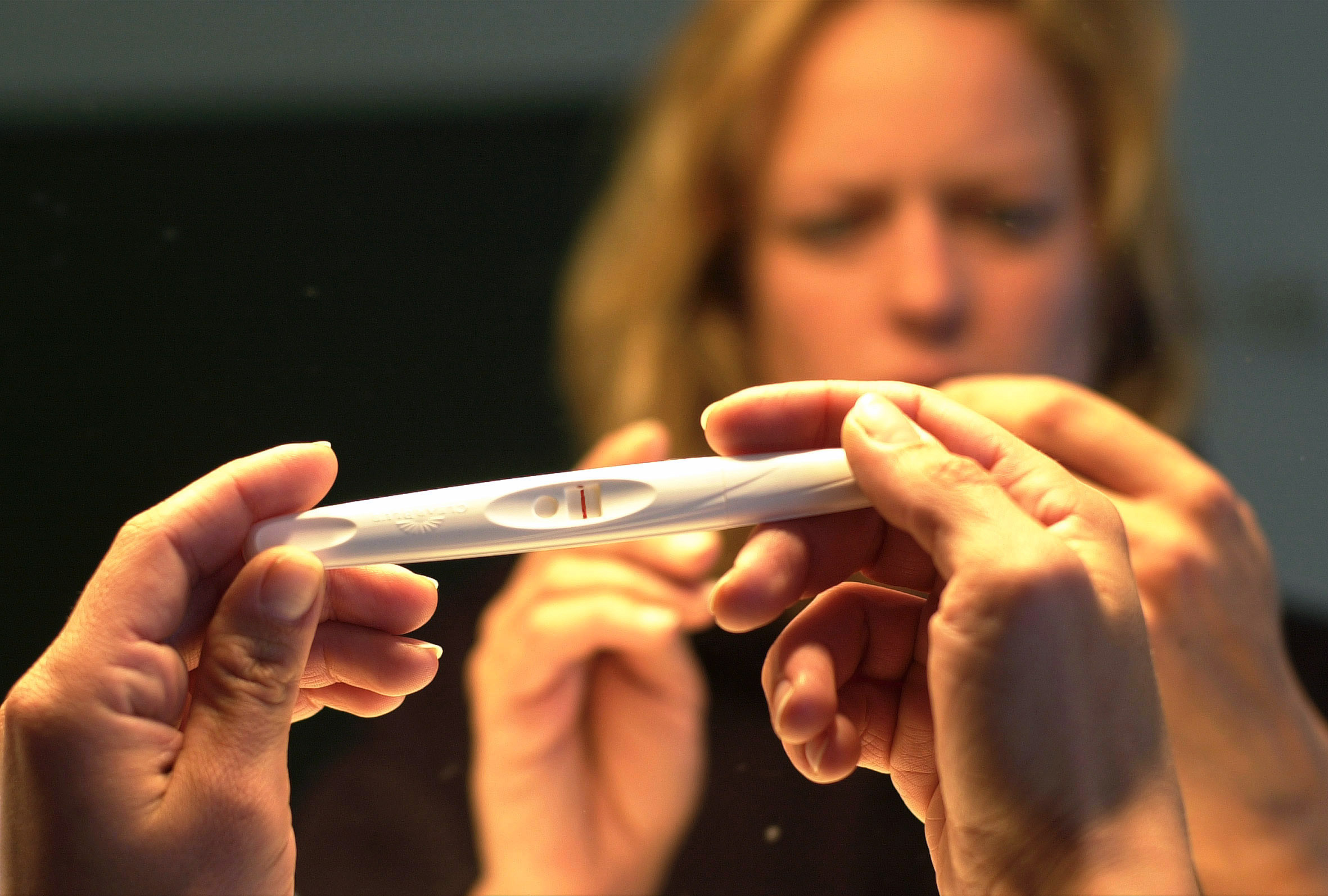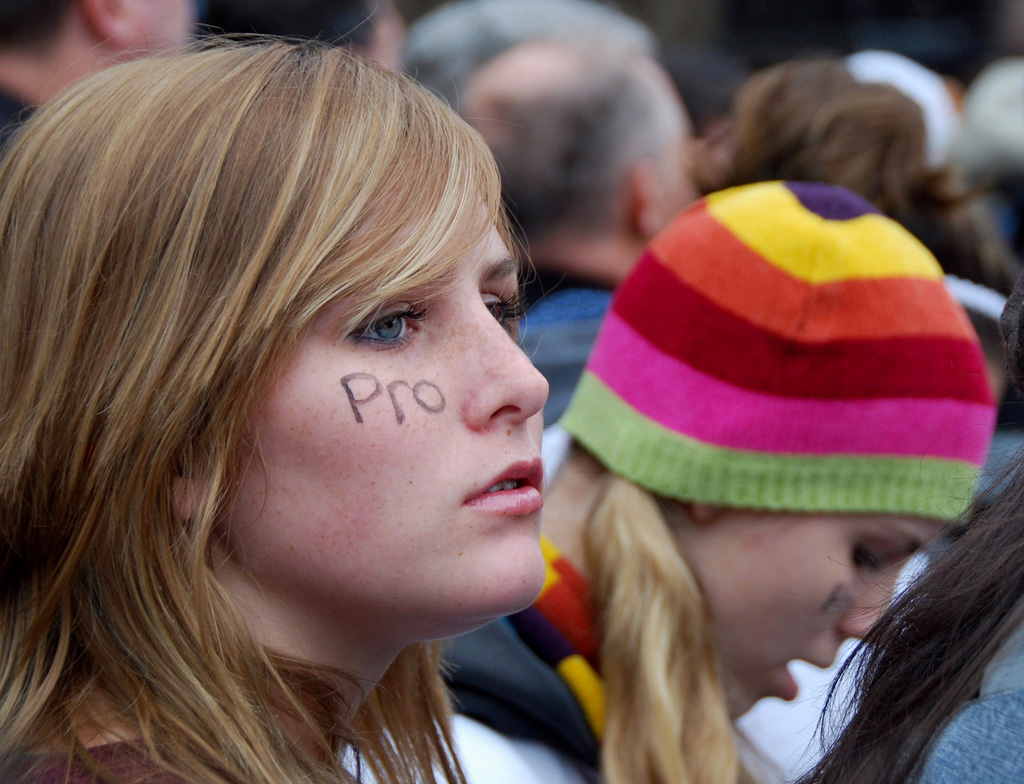The secret of Switzerland’s low abortion rate

After a decade of largely unrestricted access to abortion, the rate in Switzerland remains stable and is among the lowest in the world. How is the country achieving the oft-cited formula of ‘safe, legal and rare’?
One of the few women to go public about her abortion experience, Doris Agazzi, told swissinfo.ch she received understanding from her immediate community but also hate mail.
“I never felt ashamed or considered that it should be kept secret but I know many women did feel that way,” Agazzi said.
Swiss law changed in 2002 to allow abortion on request in the first 12 weeks of pregnancy, a liberal approach accepted by 72 per cent of voters (see sidebar). Agazzi told her story on television at that time as part of the campaign to liberalise the law.
Since then, the abortion rate has gradually fallen and stabilised and Swiss abortion statistics are published every year with little fanfare.
In 2011, the rate was 6.8 per thousand women aged between 15 and 44. This is remarkably low compared to the United Kingdom (17.5), France (15 in 2009) and the United States (16 in 2008), for example.
A handful of other countries, including the Netherlands, Belgium and Germany have rates closer to the Swiss level. The average annual worldwide abortion rate is 28 per thousand women of childbearing age.
Family planning
A low abortion rate goes hand in hand with a low rate of unwanted pregnancy. So what puts Swiss women in a stronger position when it comes to control over their fertility?
Sexual health experts point to three main factors: education, contraception and socioeconomic level.
Sex education is relatively well established in Switzerland although it is not mandatory, according to Rainer Kamber of the Swiss Association for Sexual and Reproductive Health.
“It is provided in almost all Swiss public schools, usually co-operatively by class teachers and external experts, and to a high standard,” Kamber said.
When young women and girls become sexually active, it is standard to visit a gynecologist to sort out contraception.
Johannes Bitzer, chief physician at the department of obstetrics and gynecology at University Hospital Basel, has more than 30 years’ experience in women’s reproductive health.
“We have a relatively large number of gynecologists who work in the field of what is actually primary health care. In some Anglo-Saxon countries this work is done by general practitioners,” Bitzer said.
Unprotected sex
The morning-after pill, which prevents the establishment of a pregnancy after unprotected sex, was released for sale without prescription in 2002.
This form of emergency contraception also plays a significant role. More than 100,000 packs of the morning-after pill are sold per year, according to industry estimates, although Sandoz, the manufacturer of the only brand available in Switzerland, does not give out sales figures.
Underlying all the other factors keeping the level of unwanted pregnancy low is the relative wealth of the country.
“Although unwanted pregnancies are aborted by women of all child-bearing ages and socioeconomic status, one of the most important risk factors is still a lower socioeconomic status,” Kamber explained.
Resistance
An annual total of more than 10,000 abortions per year (or 6.8 abortions per thousand women aged 15 to 44) corresponds, over time, to one in five women in Switzerland having an abortion at some point in their lives. But the termination of unwanted pregnancies is not seen as a “fact of life” by everyone.
Last month more than 1,000 people took part in a “March for Life” event in Zurich. The organisers distributed white coffins to the crowd.
On a political level a fresh effort is underway, driven by those who fought against full legalisation prior to 2002, to question the general acceptance of the issue by taking aim at abortion funding.
The initiative ‘Abortion is a private matter’, due to come before a nationwide vote next year, seeks to remove abortion from the list of procedures covered by the general compulsory health insurance package.
As an alternative, it proposes a system whereby women could either insure themselves separately against the eventuality of wishing to terminate an unwanted pregnancy, or pay for the procedure out of their own pocket.
It’s as much a moral issue as a cost-saving measure, according to Peter Föhn, a parliamentarian from the rightwing Swiss People’s Party who is co-president of the initiative committee.
“I personally am not prepared to co-finance an abortion and I also don’t expect people who are against abortion and condemn it to have to do so.” The initiative makes an exception for cases when the mother’s life is in danger and for pregnancies as a result of rape.
Ethics
In an ideal world Föhn would like to see the abortion rate in Switzerland reduced to nil. “Every killing of an unborn person, like the killing of any person, is one killing too many,” he told swissinfo.ch.
Failing that, he believes it is necessary to act, if only on a small scale. “Under no circumstances should the state or the community make abortion easy, encourage it, or as happens in Switzerland, have it paid for by basic insurance.”
Veteran abortion campaigner Anne-Marie Rey sees the initiative as a ploy by anti-abortion campaigners to turn the clock back.
“It’s just a pretext for them to have the whole abortion issue discussed again. The only women who would be affected would be the poor. It’s highly unethical and discriminatory,” she told swissinfo.ch.
As for the medical professionals, like Johannes Bitzer, they will continue to try and improve contraceptive prevalence and efficacy as well as provide care for women facing crisis pregnancies.
“We still have the situation of unwanted pregnancies and I think the ethical discussion will go on. It will always be unresolved,” he said.
80,808 live births
100,000+ morning-after pills sold
11,079 abortions (10,694 for Swiss residents)
In addition an estimated 12% of recognised pregnancies end in miscarriage.
The abortions performed on women living in Switzerland in 2011 correspond to a rate of 6.8 abortions per 1,000 women aged 15 to 44 or to 132 abortions per 1,000 live births. The figures are almost identical to those of 2010.
Three-quarters of abortions in Switzerland take place in the first eight weeks of pregnancy.
After the first trimester, abortions are allowed for health reasons, including the risk of severe mental distress, without the need for a second medical opinion. In practice only 4% of Swiss abortions are carried out after 12 weeks gestation.
Some 4% of the abortions carried out in Switzerland last year involved women living outside the country.
Almost two-thirds (64%) of women who had abortions in 2011 used the medication method (abortion pill), up from 49% in 2004.
Switzerland has a very low rate of teenage pregnancy and abortion. Girls aged under sixteen have the right to go ahead with the procedure without their parents’ knowledge.

In compliance with the JTI standards
More: SWI swissinfo.ch certified by the Journalism Trust Initiative











You can find an overview of ongoing debates with our journalists here . Please join us!
If you want to start a conversation about a topic raised in this article or want to report factual errors, email us at english@swissinfo.ch.